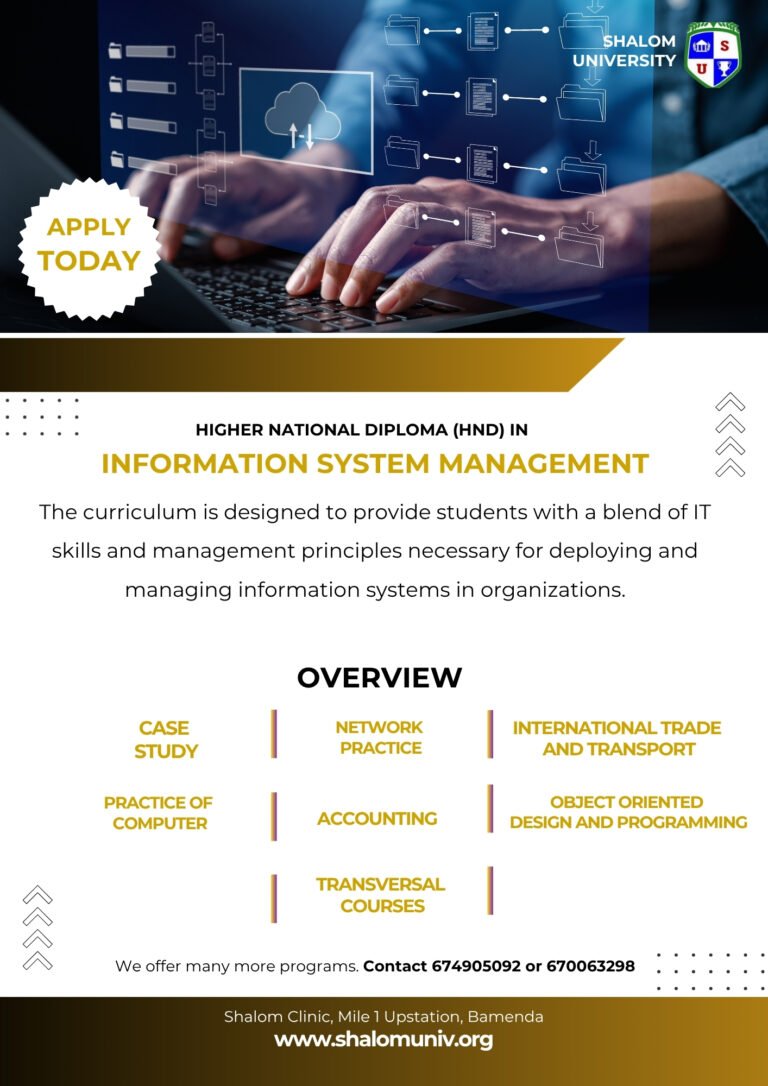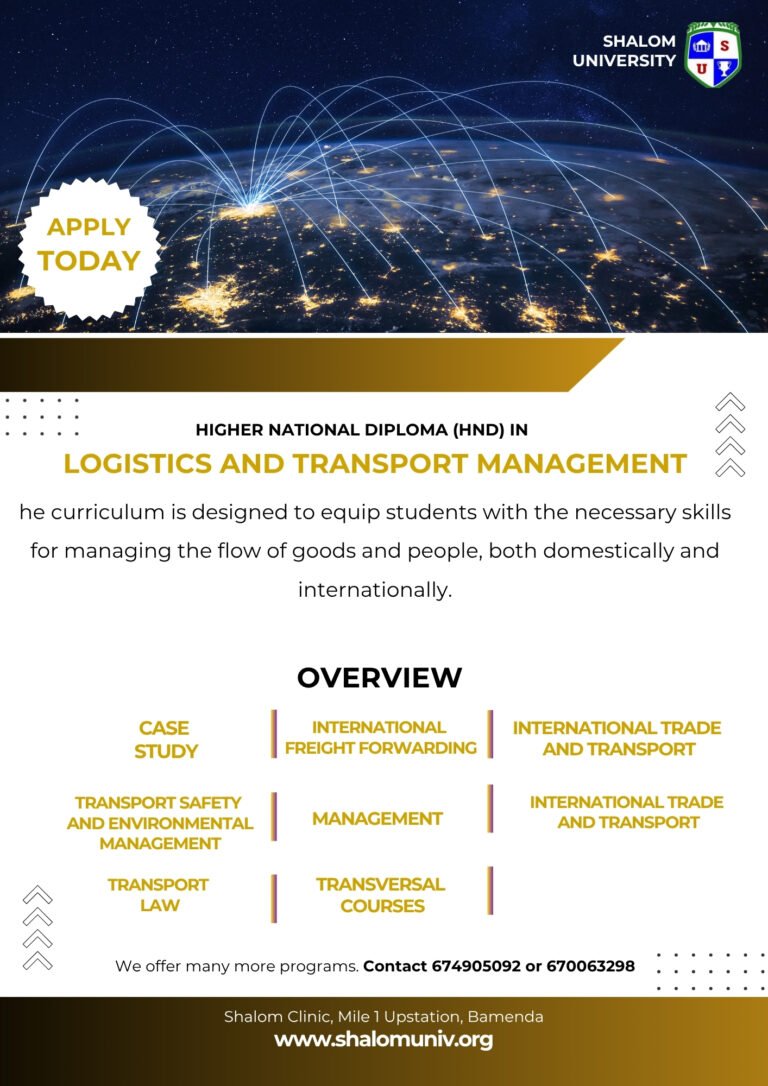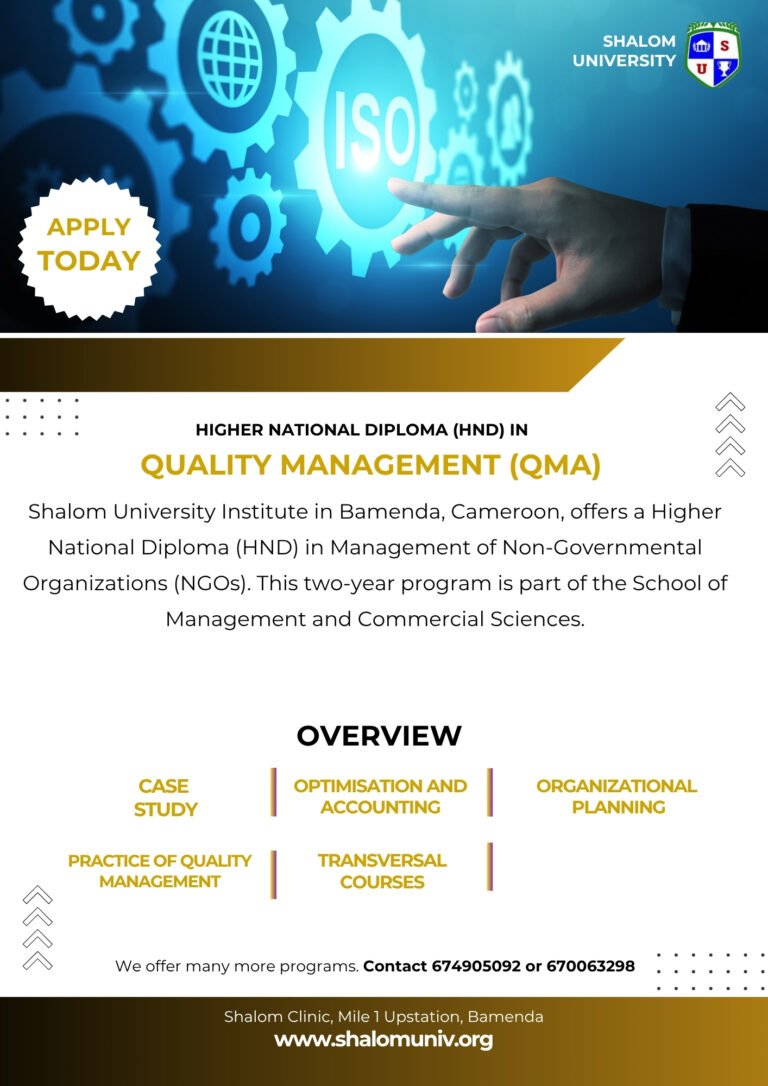In Cameroon’s evolving job market, where businesses strive for efficiency and growth, the strategic management of human capital is paramount. Organizations, whether large corporations, small enterprises, or public institutions, increasingly recognize that their employees are their most valuable asset. The HND in Human Resource Management (HRM) at Shalom University in Bamenda offers a specialized program tailored to cultivate professionals who can effectively recruit, develop, and retain talent within the unique context of the Cameroonian workforce.
The curriculum at Shalom University is designed to blend modern HR theories with practical applications relevant to the local labor laws, cultural dynamics, and economic realities of Cameroon. Graduates are prepared to serve as HR practitioners, capable of fostering productive work environments, ensuring compliance, and contributing to the overall strategic goals of their organizations.
The HUR Curriculum at Shalom University
The HND in Human Resource Management program at Shalom University is structured around a set of core papers that provide a comprehensive and practical education in the field.
Paper: Case Study
The Case Study paper is a vital component that integrates all the theoretical knowledge and practical skills gained throughout the program. It challenges students to analyze complex HR scenarios, from resolving workplace disputes to developing talent retention strategies. This is particularly relevant for HR professionals in Cameroon, who must navigate diverse workforce demographics, legal frameworks, and cultural nuances.
The course trains students to:
- Analyze real-world HR challenges: Based on a given case, students must evaluate operational, ethical, and legal challenges faced by an organization regarding its human resources.
- Identify HR-specific issues: They pinpoint specific problems related to recruitment, training, performance management, compensation, or employee relations within the Cameroonian context.
- Propose evidence-based solutions: Students formulate practical recommendations based on HR best practices, relevant Cameroonian labor laws, and management principles. For example, a case study might involve analyzing an organization facing high employee turnover and proposing a new compensation structure or employee engagement program relevant to the local market.
- Defend their decisions: During formal presentations, students must justify their analysis and proposed solutions, demonstrating their critical thinking and communication skills, which are essential for effective HR decision-making and stakeholder engagement.
Paper: Practice of Human Resource
This paper focuses on the hands-on, practical application of HR functions, providing students with the tools and techniques needed to execute HR duties effectively. It covers the day-to-day responsibilities of an HR practitioner, ensuring smooth and compliant HR operations.
Key topics include:
- Recruitment and Selection: Procedures for attracting, screening, interviewing, and selecting suitable candidates, adhering to non-discriminatory practices and local employment laws.
- Onboarding and Induction: Designing and implementing effective onboarding programs to integrate new employees into the organization and its culture.
- Performance Management: Systems for setting performance goals, conducting appraisals, providing feedback, and managing underperformance.
- Compensation and Benefits Administration: Understanding different pay structures, salary scales, benefits packages (e.g., health insurance, pensions), and their administration within the Cameroonian regulatory framework.
- Employee Relations and Discipline: Managing employee grievances, disciplinary procedures, and fostering a positive work environment, adhering to fair labor practices.
- HR Record Keeping: Maintaining accurate and confidential employee records, crucial for legal compliance and effective HR administration.
Paper: Development of Human Resource
This paper delves into the strategies and processes involved in enhancing employees’ skills, knowledge, and capabilities, which are vital for organizational growth and individual career progression. Investing in human resource development is a key strategy for improving productivity and retaining talent in Cameroon.
The curriculum covers:
- Training Needs Analysis: Identifying the skills gaps and training needs within an organization or for individual employees.
- Training Design and Delivery: Developing effective training programs, selecting appropriate methodologies, and delivering engaging learning experiences.
- Career Development: Guiding employees in planning their career paths and providing opportunities for advancement within the organization.
- Talent Management: Strategies for identifying high-potential employees, nurturing their growth, and preparing them for future leadership roles.
- Succession Planning: Developing plans to ensure continuity in critical roles by preparing employees to step into vacant positions.
Paper: Organization and Management
This paper provides students with a broader understanding of organizational structures, management theories, and leadership principles. It helps HR professionals understand their role within the larger organizational context and how they can contribute strategically to overall business objectives.
Key areas of focus include:
- Organizational Structures: Different types of organizational structures and their impact on communication, decision-making, and efficiency.
- Management Theories: An overview of classical, behavioral, and contemporary management theories and their application in the Cameroonian business environment.
- Leadership and Motivation: Understanding various leadership styles and motivational theories to inspire and guide employees effectively.
- Change Management: Strategies for managing organizational change and helping employees adapt to new processes, technologies, or strategies.
- Strategic Planning: The role of HR in contributing to an organization’s strategic planning process and aligning HR initiatives with business goals.
Cultivating Talent for Cameroon’s Future
Graduates of the HND in Human Resource Management from Shalom University are well-prepared to enter the workforce in various roles across Cameroon’s diverse sectors. They can serve as HR Assistants, HR Officers, Recruitment Specialists, Training Coordinators, or Employee Relations Officers in private companies, government ministries, NGOs, and international organizations. Their proficiency in recruitment, training, performance management, and employee relations, coupled with a deep understanding of organizational dynamics, makes them invaluable assets to any organization. The Case Study paper ensures that they are not just technically skilled but also adept at applying their knowledge to solve real HR challenges. By providing a practical and contextually relevant education, Shalom University plays a significant role in nurturing the HR expertise crucial for building strong, productive, and compliant workforces across Cameroon.




